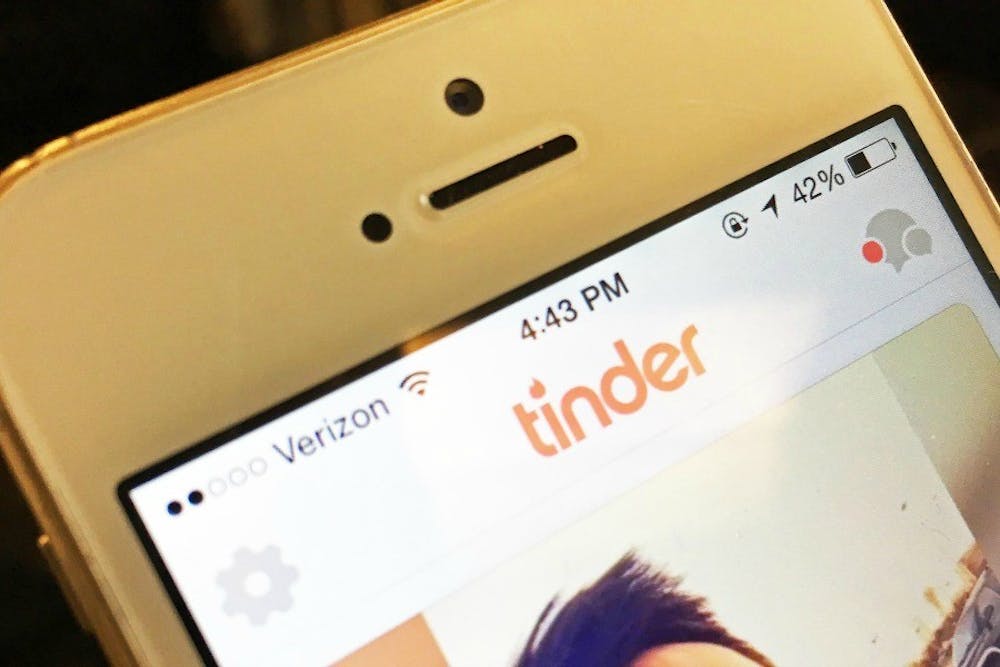By Kelly Burns and Kirby Davis, For The Miami Student
According to its official website, Tinder is a place to meet friends, start relationships and potentially find your soul mate. But to most Miami students, it's a game.
Founded in 2012, Tinder is a dating app that presents other users in your area on which you can swipe right or left, meaning you're interested or you're not, respectively. On each person's profile is their first name, a short biography and mutual Facebook friends or interests.
Two people "match" when they both swipe right on each other, and from there they can send one another messages. While many opt for a simple "Hey," others venture into riskier, or more inappropriate, territory.
Things like, "Is your name Daniel? Because damnnn," and "I'll have your panties dropping quicker than Jeb Bush drops an election" and "You look like the type of girl who would enjoy being pinned up against the wall and fucked."
First-years Keaton Bass and Nico Katsafanas agree that the only consequence of sending messages like these on Tinder is the occasional awkward public encounter with a match or the rare offended response.
Katsafanas says his ideal first message to a girl is something relatively offensive, but funny at the same time.
"It's gotta be as dirty as possible," Bass agrees.
Katsafanas says his forward approach yields a 75 percent success rate.
"There's a surprising amount of good responses to awful things . . . I think that's what they expect," says Bass.
Katsafanas and his friends participate in a group chat where they send each other screenshots of the ridiculous messages. They laugh over the responses and the fact that they sent the messages at all.
Katsafanas is not selective in who he matches with. He simply goes back and forth between swiping left and right. Bass swipes right on almost everyone. He feels bad if he doesn't.
Both students think the best use of Tinder is for pure entertainment, and while neither has taken it seriously, they don't think the girls they're messaging do either.
First-year Audri Johnson, who is two weeks into the Tinder game, isn't using the app to find her soulmate. She's just looking for a distraction and finds the messages she receives from boys amusing.
"It's just such an uncomfortable thing but it's so funny at the same time," Johnson says. " I think it's hilarious to see how desperate guys are."
Johnson humors those who dare to send her messages like "If I were a watermelon, would you spit or swallow my seeds?", which she receives on a regular basis, but also refuses to respond to less creative ones that read "Hey" or "What's up?"
Like Bass and Katsafanas, Johnson sees Tinder as a game.
On several occasions, she's given matches directions to meet her around campus, but she never shows up.
"Something came up," she says to the boys who continue to message her. She finds it hilarious.
Pick-up lines like the ones Johnson receives on Tinder are not what she would typically hear in a face-to-face conversation. So, the question becomes: why do people send them at all?
Social psychology graduate student Ryan Walker points to societal gender norms and, more importantly, personality, as potential explanations for people's Tinder-ing tendencies.
"I think a lot of it has to do with personality," Walker says. "Tinder also makes it relatively easy to act that way. It's such a quick and easy dating site . . . It's all based on superficial characteristics."
It's easy to find research conducted on social media titans like Facebook and Twitter, but little is known about the science or psychology behind newer apps like Tinder.
Walker says that, while most behavior on the app can be attributed to individual personalities, gender expectations and roles are likely affecting it as well. For example, boys are generally more willing to act brash or inappropriate on Tinder - a behavior Walker attributes to the traditional gender roles of society. Males are expected to court females, propose and generally make the first move. Females on the other hand, are generally expected to be on the receiving end of these gestures.
While societal expectations play a part in motivating this behavior, personality is the driving factor behind the type of messages Tinder users send.
"There's research that shows that those with lower personality trait conscientiousness are more likely to engage in riskier behavior when meeting an online dating partner," Walker says.
Like Johnson, Bass and Katsafanas say they would never meet up with someone they met on Tinder.
"I awkwardly saw a girl once. I do my best to avoid [that], it's really uncomfortable," Bass says.
According to the boys, part of the reason they send the messages they do is because a screen separates them from the recipient of the messages.
Katsafanas said, neither one of them would say these things, even to their friends, in real life.
"You're way braver behind a phone," he says.

